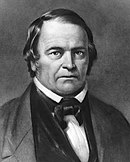| Part of a series on |
| Adventism |
|---|
 |
|
|
Adventism is a branch of Protestant Christianity[1][2] that believes in the imminent Second Coming (or the "Second Advent") of Jesus Christ. It originated in the 1830s in the United States during the Second Great Awakening when Baptist preacher William Miller first publicly shared his belief that the Second Coming would occur at some point between 1843 and 1844. His followers became known as Millerites. After Miller's prophecies failed, the Millerite movement split up and was continued by a number of groups that held different doctrines from one another. These groups, stemming from a common Millerite ancestor, collectively became known as the Adventist movement.
Although the Adventist churches hold much in common with mainline Christianity, their theologies differ on whether the intermediate state of the dead is unconscious sleep or consciousness, whether the ultimate punishment of the wicked is annihilation or eternal torment, the nature of immortality, whether the wicked are resurrected after the millennium, and whether the sanctuary of Daniel 8 refers to the one in heaven or one on earth.[1] Seventh-day Adventists and some smaller Adventist groups observe the seventh day Sabbath. The General Conference of Seventh-day Adventists has compiled that church's core beliefs in the 28 Fundamental Beliefs (1980 and 2005).
In 2010, Adventism claimed to have some 22 million believers who were scattered in various independent churches.[3] The largest church within the movement—the Seventh-day Adventist Church—had more than 21 million members in 2020.[4]
- ^ a b Mead, Frank S.; Hill, Samuel S.; Atwood, Craig D. (2006). "Adventist and Sabbatarian (Hebraic) Churches". Handbook of Denominations in the United States (12th ed.). Nashville, Tn: Abingdon Press. pp. 256–276.
- ^ Bergman, Jerry (1995). "The Adventist and Jehovah's Witness Branch of Protestantism". In Miller, Timothy (ed.). America's Alternative Religions. Albany, NY: SUNY Press. pp. 33–46. ISBN 978-0-7914-2397-4. Archived from the original on 2020-07-24.
- ^ "Christianity report" (PDF). Archived from the original (PDF) on 2013-08-05. Retrieved 2014-12-30.
- ^ "Seventh-day Adventist World Church Statistics 2020". 13 January 2021.